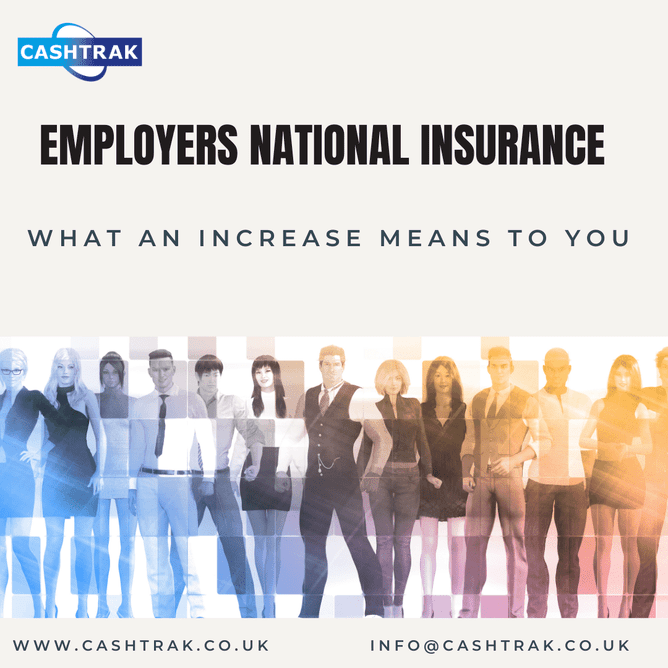As the political landscape in the UK continues to shift, businesses are keeping a close eye on proposed changes that may impact their operations. One significant potential change is the increase in Employer National Insurance contributions (NICs), which could be introduced by the Labour government in the upcoming budget.
For small businesses, this could have notable financial implications, affecting both their bottom line and the workforce. In this blog, we’ll explore what this potential National Insurance rise could mean for small business owners and their employees, and how to prepare for it.
What Is National Insurance?
National Insurance (NI) is a tax that employers and employees pay to fund essential services such as the NHS, state pensions, and other benefits. For employers, the Employer’s National Insurance Contributions (NICs) are a significant portion of payroll costs, typically calculated as a percentage of employees’ earnings above a certain threshold.
The Potential National Insurance Rise
Under Labour’s potential plans, there has been talk of increasing Employer NICs to generate additional revenue for public spending, particularly to support healthcare and social services. While specific details of the increase are yet to be confirmed, small businesses need to understand how even a modest rise could impact them financially.
What Could This Mean for Small Businesses?
1. Increased Payroll Costs
The most immediate impact of a National Insurance increase is the rise in payroll costs. Employers currently pay 13.8% on employees' earnings above *£9,100 (for the 2023/2024 tax year). If this rate is increased, even by a small margin, it could significantly raise the cost of employing staff, especially for small businesses operating on tight margins.
*Dependent on the employees circumstances which is signified by the letter category assigned to them
2. Hiring Decisions
For many small businesses, wage bills are one of the largest ongoing expenses. An increase in Employer NICs could lead to difficult decisions regarding recruitment and staffing levels. Employers may reconsider hiring new staff or expanding their workforce due to the added cost of taking on employees. In some cases, businesses might have to delay hiring or even freeze recruitment to manage costs effectively.
3. Pressure on Profit Margins
With increased payroll costs, small businesses may find it challenging to maintain their current profit margins. For businesses that already operate in competitive markets or have limited pricing power, absorbing higher NICs without increasing prices could lead to reduced profitability.
4. Price Increases
To offset the additional cost of an NICs rise, some small businesses may be forced to pass on these costs to customers. This could result in price increases for goods and services, which could have knock-on effects on consumer demand, particularly in price-sensitive sectors.
5. Impact on Cash Flow
An increase in NICs could also strain cash flow, especially for businesses with smaller reserves or those still recovering from the financial impact of the COVID-19 pandemic. The need to pay higher NICs could leave businesses with less working capital, making it harder to manage day-to-day expenses.
How Could This Affect Employees?
1. Pay Freezes or Reductions
With businesses facing higher payroll costs, employees may be affected indirectly. In order to manage expenses, employers may decide to implement pay freezes or limit salary increases. In some cases, businesses may have to reduce staff hours or cut back on employee benefits to offset the higher costs.
2. Job Security Concerns
If small businesses are forced to reduce their workforce or avoid new hires due to increased NICs, employees may feel less secure in their positions. In industries with already slim margins, any added costs could make it difficult for employers to retain all staff, increasing the risk of redundancies.
3. Impact on Employee Benefits
Businesses may also reassess their overall compensation packages. Employee benefits such as pension contributions, bonuses, or other perks may be scaled back to compensate for the rising costs of Employer NICs.
How Can Small Businesses Prepare?
1. Review Payroll and Forecasting
Small businesses should start reviewing their payroll costs and projections for the coming year. Conducting a financial forecast that factors in a potential NICs rise will give you a clearer idea of how much extra you may need to budget for.
2. Explore Automation and Outsourcing
If labour costs increase, businesses may look for opportunities to improve efficiency. This could mean automating certain processes or outsourcing non-core activities to reduce the need for additional staff while maintaining operational capacity.
3. Consider Salary Sacrifice Schemes
Some businesses may opt for salary sacrifice schemes where employees agree to a reduction in salary in exchange for non-cash benefits, like enhanced pension contributions. This can reduce the overall payroll burden and, in turn, lower Employer NICs.
4. Review Your Pricing Strategy
If absorbing the added cost of NICs isn’t feasible, review your pricing model. While price increases may be necessary, they should be balanced carefully to avoid alienating customers. Consider adding value through your services or products to justify any potential price hikes.
5. Stay Informed and Seek Professional Advice
Stay up to date with the latest announcements from the government regarding tax changes, especially as the next budget approaches. If you're unsure how these changes might impact your business, consult with a financial advisor or a bookkeeping service that can help you navigate the complexities of rising NICs.
Conclusion
While it’s still uncertain whether the Employer National Insurance rise will be implemented, small businesses should start preparing for the possibility now. By understanding the potential financial impact and taking proactive steps, businesses can mitigate the effects and continue to operate smoothly.
At Cashtrak, we can help you navigate the potential Employer NIC rise by reviewing your costs, providing expert guidance and implementing cost-saving changes. With our tailored solutions, you could actually save your business money on taxes and improve efficiency through better processes. Let us help you stay ahead and keep more of your hard-earned profits!
Contact us today by clicking here.

